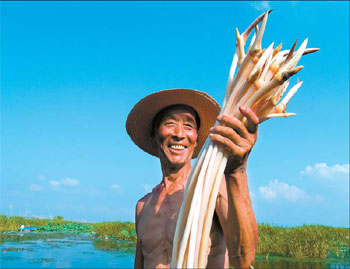Making the world a better place
By Yang Cheng (China Daily)Updated: 2007-06-26 09:48
For Zhang Shengyuan, a local fisherman in Honghu Lake, Hubei Province, his life was radically transformed by HSBC.
He used to do fishing and bird hunting in the area for decades.
After joining the HSBC-WWF Yangtze River Program, he understood the biological diversity was being destroyed by fishermen's deeds.
|
A bountiful harvest for a fisherman in Honghu Lake, Hubei Province. He has benefited from a Yangtze River environmental protection project sponsored by HSBC. |
He has since then given up his gun and been appointed protector of endangered birds in the zone. He has even risked his life several times as he stepped into swamps to save birds.
The farmers, whose health being affected by the worsening water quality, would use bamboo poles to obstruct the flow of water so as to prevent fish from swimming back to the Yangtze River in the past. They habitually engaged in this activity in order to catch as many fish and hunt as many birds as possible.
As a consequence, inbreeding among the fish led to inferior quality fish being born, which were much smaller in size. Within a few years, the locals' lucrative fishing business seemed like being on its last legs.
The deteriorating ecological condition of Honghu Lake pained HSBC, who then donated 30 million yuan to WWF to establish the Yangtze program to save the lake and the fish.
Since 2002, model zones have been established in the Zhangdu, Tian'ezhou and Honghu lakes, three offshoots of the Yangtze River.
The program was aimed at removing obstacles to water flow between the three branch lakes and the Yangtze River, expanding wetland area, warding off floods and enhancing biological diversity.
Meanwhile, HSBC and WWF also assisted local farmers in the development of sustainable industries, in a bid to raise their income.
HSBC staff members now derive much delight from the remarkable achievements made by their project.
The seasonal linkage of 11 lakes with the Yangtze River were rebuilt. Wetlands covering 450,000 hectares were effectively protected, with water quality improved and 34 varieties of birds and 14 species of fishes freely traveling back to the river.
Daavid deer and river dolphin, two valuable species in the Yangtze River area, have been effectively protected.
In all, 15 million bamboo poles and fishing nets were removed, and the "falling and rising tide of the Honghu Lake" re-emerged.
Members of 296 families were taught to adopt sustainable fishing solutions, which helped to increase their incomes by over 20 percent.
To further help safeguard the environment, the HSBC has assisted Botanic Garden Conservation International with $1.16 million to protect endangered species and helped enhance public awareness of plant conservation through workshops, publications and exhibitions.
The banking giant has mobilized 2,000 bank employees across the globe, including 33 in China, to assist scientists with research on wildlife and the environment around the world.
Nearly 2,000 officials from the Chinese mainland have attended the HSBC Wetland Management Training Program in Hong Kong Special Administrative Region since 1998.
In recent years, community-based education, training and research work have also started in the demonstration sites in Haifeng of Guangdong Province and Zhangjiang Estuary of Fujian Province.
The HSBC and UNEP-Tongji Institute of Environment for Sustainable Development at Tongji University jointly launched the "Tongji-HSBC Leadership Program: Environment for Sustainable Development" in 2006, which is to be held once every two years.
(China Daily 06/26/2007 page19)
(For more biz stories, please visit Industry Updates)
